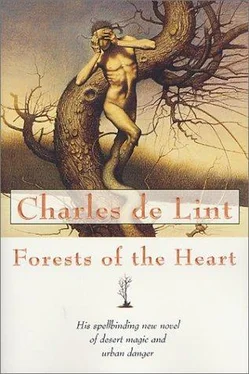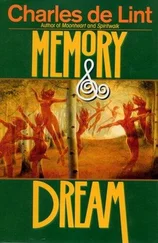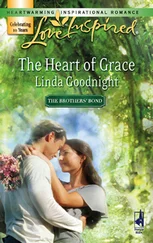“I think you’re right. That’s what got to me with Donal’s teasing the other night. I started thinking about how Miki and I are such good friends, and how that seemed to automatically preclude us having any other sort of a relationship.”
Ellie smiled. “So Donal was right. You do fancy her.”
Hunter shook his head. “No. I keep finding myself looking at her and wondering about it, but I know it’s not like that. What it really got me thinking about was how that lack of a solid friendship was what made my last relationship fall apart. After that big buzz that comes when you first connect, we just became a habit to each other. Turns out we weren’t so good at the friendship part.”
“You’re talking about Ria?”
He looked surprised.
“We’re a small crowd,” Ellie said with a sympathetic smile. “And much prone to gossip.”
“No kidding. I suppose Donal told you about it.”
Ellie shook her head. “No, Jilly did.”
“It is a small crowd, isn’t it?”
“Pretty much. But don’t worry,” she added. “It’s not like all the details are making the rounds.”
“I guess I should be grateful for that.”
Ellie smiled. “But it does feel weird when it’s our own lives that become grist for the old gossip mill.”
“Tell me about it. Imagine what it’d be like to be famous and to have to read about all your personal ups and downs in the tabloids.”
“No thanks.”
“But I haven’t even asked you anything yet,” a new voice said.
They both looked up to find Jilly standing in front of them, hands on her hips. Her cheeks were flushed, blue eyes sparkling, and a light sheen of perspiration dampened her brow. Loose strands of hair clung to her temples, having escaped from the bun she’d put up in a futile attempt to tame her usual unruly locks. Ellie didn’t think she knew anyone who could cram so much energy into one petite package. Jilly had been dancing since the moment the group of them had arrived and didn’t seem to be even remotely ready to stop. She grinned at the pair of them, her good humor so infectious that Ellie couldn’t help but smile back.
“I know Donal can be a poop,” Jilly said, “but I expected better from you, Ellie. This isn’t a night to be wallflowering it—it’s a night for silly feet and general hullabalooing. So come on.” She took them both by the hand and gave them a tug towards the dance floor. “The band needs our warm bodies thrown about in mad jigging and reeling to keep them all revved up.”
Ellie and Hunter looked at each other, then set their drinks against the wall and let her pull them to where the rest of their friends were dancing.
“Nice to see you out and about,” Jilly said to Hunter.
Ellie had another smile as Hunter gamely tried to get into the swing of things.
“I hear you’ve been telling tales out of court,” he said.
“Only the nicest ones,” Jilly assured him. “Just to let everyone know that you’re available once more. Wouldn’t want you to get all lonely—or worse, all morose like himself.”
“She means Donal,” Ellie told him.
“I knew that.”
After the show, Hunter stayed behind with Ellie and her friends to help put away the chairs and generally clean up the community center. It turned out that most of them were members of the Newford Traditional Music Society—no surprise there, Hunter thought, considering how much they seemed to like the music. The rest, like himself, were simply willing to pitch in and give a hand.
They were a much nicer group of people that he’d expected them to be, and that was a surprise. He’d met a number of them before, in the record store, or through Ria at various parties, gallery openings, and the like, but he’d never really interacted with them in the same way as he had tonight.
“You feel like an outsider,” Ria would tell him when they got home after one of those soirees, “because you act like an outsider. You wouldn’t feel nearly so uncomfortable if you took the time to get to know them.”
Being the truth, it was hard to respond to. No one had ever made him feel out of place. In fact, they often went out of their way to make him feel welcome. But the problem was he did feel like an outsider. They were all such creative people, where he was lucky to be able to put together a window display that looked even halfway decent, never mind innovative. And if that wasn’t intimidating enough, not only was it quickly apparent that they had wide-ranging interests—from the arts and literature, through the sciences, history, mythology, and current affairs—they were also able to discuss those same eclectic subjects with obvious ease and informed knowledge.
All he could enthuse about was music. He wasn’t as badly introverted as Titus or Adam, but when he was among such outgoing people as this crowd, he usually felt as woefully lacking in the social graces as he knew his employees to be. It wasn’t something that was very easy to explain to someone else, especially since it was so hard to admit it even to himself.
Ria never seemed to have the patience to listen through his stumbling attempts to articulate how her friends made him feel intimidated. Nor did she have much sympathy.
“If you want to be better informed about more things,” she’d say, “get your nose out of those music magazines you’re always reading and broaden your horizons a little more.”
“I need to read those for my work,” he’d explain.
“I know. Nobody’s putting you down or thinks you’re stupid. Can’t you tell that they like you?”
But I feel stupid, he’d want to say.
He’d often wondered what it was that she saw in him. It hadn’t been like that at first. When they first met, she’d been as scruffy as he still was, always happier in jeans and a T-shirt as opposed to what she had to wear to the office. She’d loved music, too—all sorts, in those days. But she’d changed—“I’ve grown, Hunter,” was how she put it—and he hadn’t. Or couldn’t. Or, perhaps more truthfully, he didn’t want to.
Music had become an intrinsic part of his life from the day he bought his first Dave Clark Five single. It wasn’t a matter of performing himself—though that had been an ambition at one point—but simply to be involved with the music industry. To discover new sounds before anyone else did. To follow bands through their various lineups and solo efforts. He loved the buzz of getting a first listen to the new releases when the sales reps dropped off their promotional material. He loved introducing people to music they might never otherwise have tried.
But that was a kid’s life, so far as Ria was concerned. Not a viable career for an adult.
She kept getting promotions, rising from a clerical position into management, dressing better, taking more care in her appearance, not simply at work, but at home as well. She took up painting with courses at the Newford School of Art, which was where she’d fallen in with Jilly and her crowd. She started talking about marriage and buying a home and starting a family. She was the one who’d talked him into buying the record store. “I thought the responsibility would be good for you,” she’d said when the store became yet one more point of contention.
“It might have been,” he’d told her, “if you’d cared about it as much as I do.”
“You’re not getting the point.”
Only Hunter had. He just hadn’t known what to do with it. They’d fallen into such a rut of bad habits and arguments that it wasn’t until she left that he’d realized how much he still cared for her. But by then it was too late.
He almost hadn’t come to the show tonight. Knowing that Jilly and the rest of them would be here tonight, he’d half-expected to see Ria as well. But of course Celtic music wasn’t her thing anymore. If it ever had been. If it hadn’t simply been one of those instances where one professed delight with a potential partner’s tastes because everything had a rosy shine to it when a relationship began.
Читать дальше












